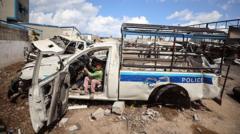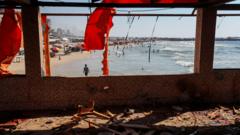A senior officer's revelations highlight the disintegration of Hamas's control, suggesting a shift toward armed gangs taking over amid ongoing Israeli strikes.
Hamas Officer Reveals Loss of Control Over Gaza Amid Ongoing Conflict

Hamas Officer Reveals Loss of Control Over Gaza Amid Ongoing Conflict
Senior Hamas security personnel disclose significant internal collapse as lawlessness intensifies in Gaza.
In a candid disclosure, a senior officer within Hamas's security forces has stated that the militant group has lost about 80% of its control over the Gaza Strip, with armed clans rapidly filling the security void. Speaking to the BBC under conditions of anonymity, the lieutenant colonel revealed that the relentless Israeli bombardments have effectively dismantled Hamas's command structure, resulting in widespread chaos across the territory the group previously governed.
The officer, who was injured early in the conflict ignited by a Hamas-led assault on Israel on October 7, provided insights into the alarming state of security in Gaza, stating, “Let’s be realistic here - there’s barely anything left of the security structure. Most of the leadership, about 95%, are now dead… The active figures have all been killed.” He pointed out that due to the lack of leadership, the ongoing war could persist indefinitely, saying, “All the conditions are aligned: Israel has the upper hand, the world is silent, the Arab regimes are silent, criminal gangs are everywhere.”
Drawing attention to Hamas's efforts prior to March when a ceasefire was breached, the officer explained that the group attempted to reorganize itself but faced relentless strikes from Israel that targeted their remaining command structures. “The security situation has completely collapsed. Totally gone. There’s no control anywhere,” he lamented, elaborating on how Hamas’s key security institution was looted with minimal intervention from any authority.
He underscored the emergence of various armed groups linked to powerful local clans, suggesting that these factions are now serious contenders for control in Gaza, with resources to challenge Hamas. Notably, one such figure, Yasser Abu Shabab, has garnered attention for his growing influence, reportedly receiving arms from Israel, and is viewed by Hamas as a significant threat due to his potential to unify opposition against them.
As armed clans begin to dominate, the former Hamas officer described armed groups as operating freely, capable of violence without fear of reprisal. “If someone like Abu Shabab can rally those forces, that could be the beginning of the end for us,” he warned. Amidst such turmoil, Hamas finds itself confrontingenemies not just from outside, but increasingly from within, spiraling further into a state of lawlessness and vulnerability amidst ongoing conflict.
The officer, who was injured early in the conflict ignited by a Hamas-led assault on Israel on October 7, provided insights into the alarming state of security in Gaza, stating, “Let’s be realistic here - there’s barely anything left of the security structure. Most of the leadership, about 95%, are now dead… The active figures have all been killed.” He pointed out that due to the lack of leadership, the ongoing war could persist indefinitely, saying, “All the conditions are aligned: Israel has the upper hand, the world is silent, the Arab regimes are silent, criminal gangs are everywhere.”
Drawing attention to Hamas's efforts prior to March when a ceasefire was breached, the officer explained that the group attempted to reorganize itself but faced relentless strikes from Israel that targeted their remaining command structures. “The security situation has completely collapsed. Totally gone. There’s no control anywhere,” he lamented, elaborating on how Hamas’s key security institution was looted with minimal intervention from any authority.
He underscored the emergence of various armed groups linked to powerful local clans, suggesting that these factions are now serious contenders for control in Gaza, with resources to challenge Hamas. Notably, one such figure, Yasser Abu Shabab, has garnered attention for his growing influence, reportedly receiving arms from Israel, and is viewed by Hamas as a significant threat due to his potential to unify opposition against them.
As armed clans begin to dominate, the former Hamas officer described armed groups as operating freely, capable of violence without fear of reprisal. “If someone like Abu Shabab can rally those forces, that could be the beginning of the end for us,” he warned. Amidst such turmoil, Hamas finds itself confrontingenemies not just from outside, but increasingly from within, spiraling further into a state of lawlessness and vulnerability amidst ongoing conflict.


















